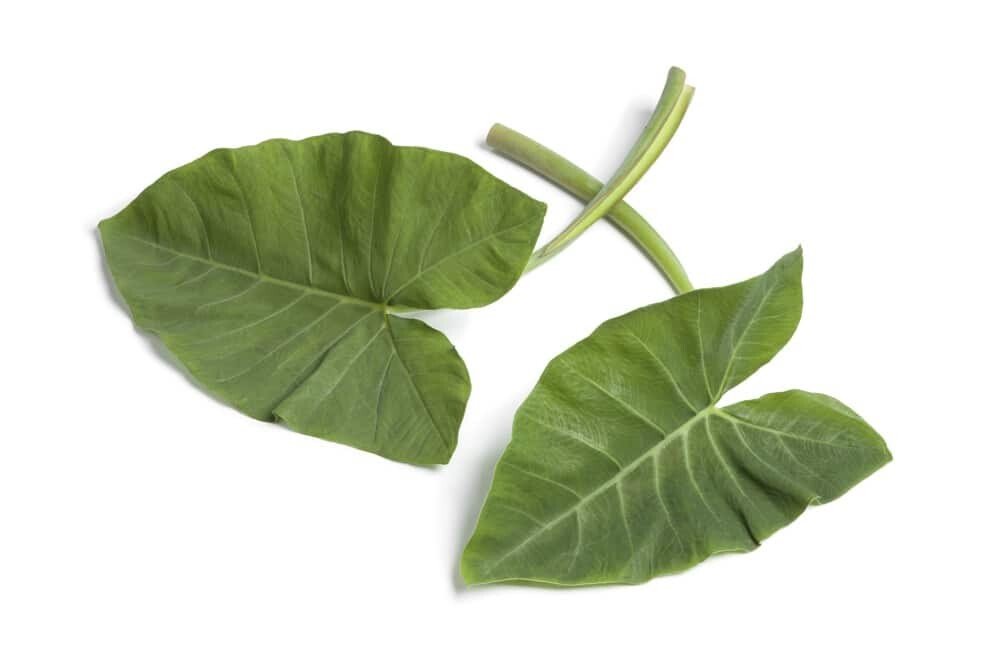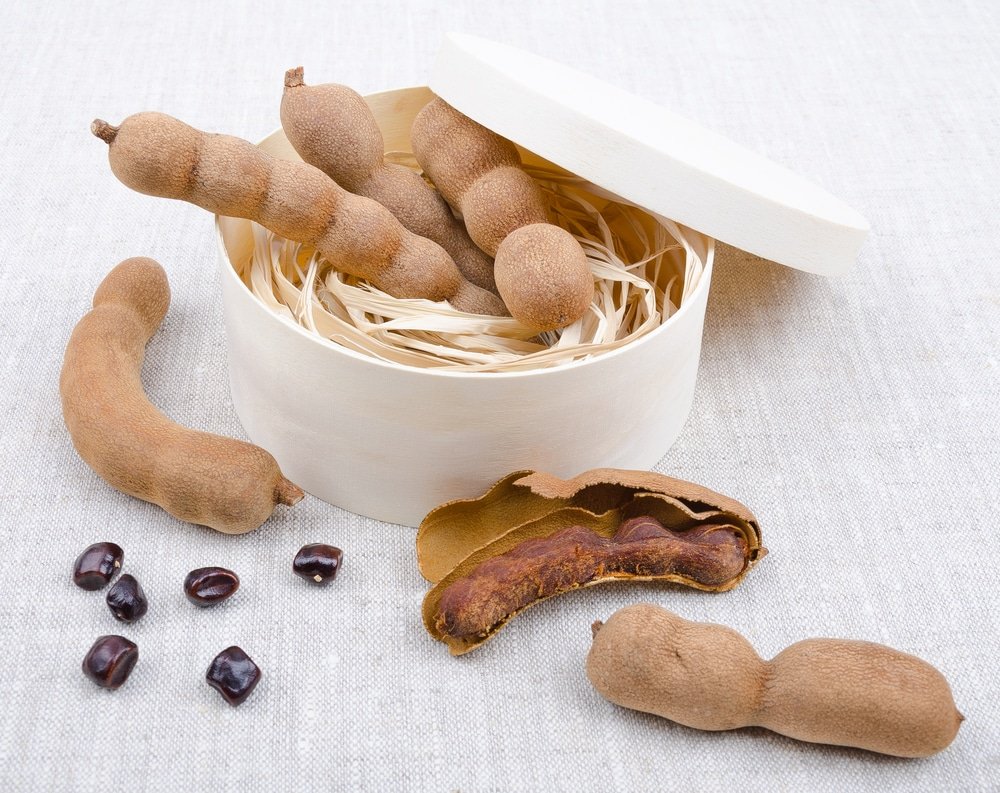Taro leaves flourish wherever there is abundant sun and moisture, meaning that you can find them virtually everywhere in the tropics. Loaded with nutrition, and effective remedies for some of the most common ailments affecting us today, you can surely benefit from consumption of more of it.
What Are Taro Leaves?
Taro leaves are basically the above ground shoot and leafy portion that accompany taro roots, which are found under the ground and look like a hairy version of a potato. Taro leaves are generally green and have a shape that looks like a heart. They are also classically resistant to water, in the sense that water easily slides off of their surface without adhering.
Known binomially as Colocasia esculenta, they were originally native to parts of Southeast Asia, but are commonly found in the Caribbean and South American tropics as well these days. The leaves are completely fine for consumption once cooked, but should not be eaten raw since they are high in oxalate content (compound which increases the risk of kidney stones).
Taro Leaves Nutrition (per 100g)
Here is a chart showing the nutritional value of taro leaves per 100 grams (cooked, boiled, without salt):
| Nutrient | Amount per 100g |
|---|---|
| Calories | 42 kcal |
| Water | 90.18 g |
| Protein | 3.70 g |
| Total Fat | 0.50 g |
| Saturated Fat | 0.10 g |
| Carbohydrates | 6.70 g |
| Dietary Fiber | 4.1 g |
| Sugars | 0.40 g |
| Vitamin C | 48.9 mg (54% DV) |
| Vitamin A | 6,455 IU (129% DV) |
| Vitamin E | 2.95 mg (20% DV) |
| Vitamin K | 76.8 µg (64% DV) |
| Folate | 42 µg (11% DV) |
| Potassium | 648 mg (14% DV) |
| Calcium | 107 mg (11% DV) |
| Iron | 2.25 mg (13% DV) |
| Magnesium | 57 mg (14% DV) |
| Phosphorus | 40 mg (6% DV) |
| Sodium | 6 mg |
- Note: Percent Daily Values (DV) are based on a 2,000-calorie diet.
This chart highlights the rich nutritional value of taro leaves, particularly their high content of Vitamin A, Vitamin C, Vitamin K, and potassium, along with dietary fiber and protein.
12 Amazing Health Benefits of Taro Leaves

1. Reduces Cholesterol
Taro leaves are frequently used by Pacific Island natives for the management of cholesterol, which it has been doing effectively for centuries. Much of its ability to lower cholesterol is due to its fiber content, which helps to slow the absorption of dietary fats and also enhances the excretion of bile in stool. As this occurs, cholesterol levels drop to compensate for increased production of new bile enzyme.
2. Supports Digestion
Taro leaves can help to support a healthy digestive process in large part once again thanks to the fiber content. Fiber helps to promote rapid transit of waste material though the digestive tract and out of the body, and also because it can act as a source of nourishment for the probiotic bacteria residing in your small intestine.
3. Benefits Heart Health
Taro leaves are excellent for helping to support the health of your heart as they possess nutrients to do so via several mechanisms. For instance, the fiber by helping to reduce cholesterol levels in turn decreases the likelihood of oxidation occurring and subsequent atherosclerotic plaques developing. But there is more – taro leaves are also very high in potassium, an important mineral for regulation of blood pressure and overall fluid balance.
Potassium also acts as a mild vasodilator and can help keep blood vessels flexible and able to deal with fluctuations in blood pressure.
4. Helps Reduce Cancer Risk
Taro leaves are rich sources of two of the best anti-oxidant vitamins of the planet, Vitamin A and C. These vitamins have several roles to play in the body, but one of their most important relates to assisting with the prevention of cancer by neutralizing free radicals that can damage healthy cells.
Cells, once damaged are likely to undergo mutations that can result in cancer eventually. Nipping cellular damage early on can stop this cascade of adverse changes and reduce your risk of cancer.
5. Supports The Immune System
Taro leaves support the immune system as a result of the high content of antioxidant nutrients it possesses, and also the fiber which acts as nourishment for the probiotic bacteria residing in your intestines. These bacteria form the primary part of your immune system, especially when it comes to things you put in your mouth. Healthy probiotic cultures also coincide with decreased frequency of allergies or asthma the attacks and even decreased likelihood of specific cancers such as those of the colon.
6. Enhances Vision
Taro leaves are surprisingly very rich in Vitamin A, necessary to support the health and function of your eyes. In addition to improving low-light vision, Vitamin A can also safeguard your eyes from oxidative damage and help prevent the occurrence of macular degeneration. Be sure to consume taro leaves in addition to other staples which are known to be rich sources of Vitamin A for best results.
7. Supports Healthy Pregnancy
Taro leaves are good sources of dietary folate, an extremely important nutrient for helping to ensure the health of the unborn child. Sufficient folate consumption reduces the likelihood of spina bifida occurring, and assist with healthy development of the neural tube. Other birth defects are also reduced in like manner.
8. Can Help Treat Anemia
If you are vegetarian taro leaves can quickly become one of your best sources of dietary iron, helping to treat or better yet prevent anemia. Iron, in conjunction with its vitamin C content helps to promote absorption and lends itself to synthesis of red blood cells in bone marrow. Be sure to add these to your diet if you are not positive that you’re meeting your daily iron requirements.
9. Good For Skin
Taro leaves are extremely good for the health of your skin, thanks to the high quantities of vitamin C and A that it contains. Vitamin A can help to reduce the impact of the sun’s rays on the skin, acting as a sort of natural sunscreen. Vitamin C on the other hand is an integral role in collagen synthesis, with this protein being the primary one found in skin. Combined with the strong antioxidant actions of these vitamins, your skin health is sure to benefit and flourish.
10. Support Male Sexual Health
Taro leaves should be considered a very effective natural male enhancement remedy, as it can be of benefit to several aspects. For instance, it contains small amounts of the trace minerals zinc and selenium, which contribute to spermatogenesis. In addition to this, taro leaves are rich in the amino acid L-arginine, which boost blood flow and enhance erection potency.
Arginine also improves the ability of sperm to swim, having a positive effect on your reproductive potential. If you are trying to conceive, this is one food you should be sure to get.
11. Supports Bone Health
Taro leaves once again come to the rescue of vegetarians everywhere, as it contains a decent amount of calcium to help fortify the health of your bones and teeth. Even though calcium can be obtained from tofu and other soy-based products, it is always good to have variety in your diet. Taro leaves can also be an attractive option to people that are lactose intolerant and can help bring you closer to your daily requirements.
12. Supports Liver Function
One of the most interesting ways taro leaves help to support detoxification is their ability to promote the removal of heavy metals from the body. Heavy metals usually become sequestered in fat and stay there for years, inadvertently having adverse effects on the individual. They are very difficult to remove, but taro leaves can assist with getting rid of these toxins, even though it may only be in minuscule amounts.
Conclusion
While taro leaves are exceptionally healthy and nutritious, sadly in some parts of the world they are regarded merely as weeds, though in reality they are some of nature’s healthiest foods. Next time you get your hands on some taro, don’t just eat the roots and toss the leaves, be sure to take advantage of both of them.
[james]https://nutritiondata.self.com/facts/vegetables-and-vegetable-products/2676/2
https://foodfacts.mercola.com/taro.html[/james]



